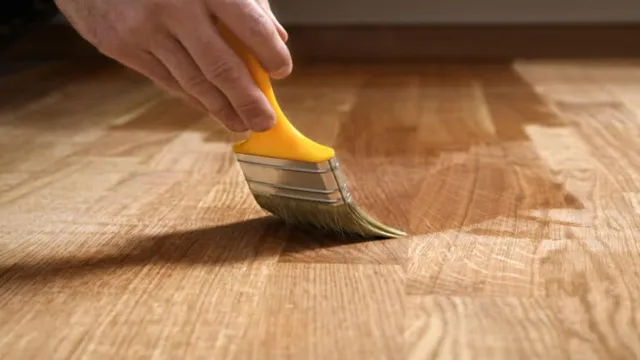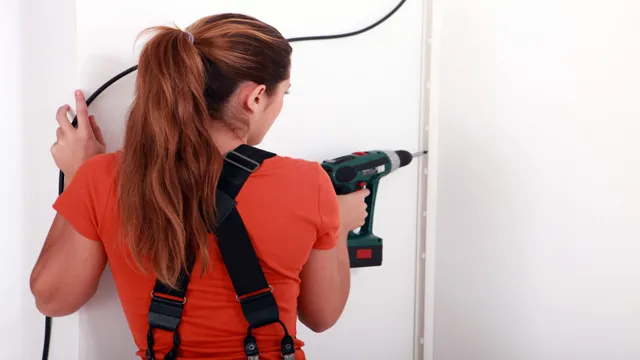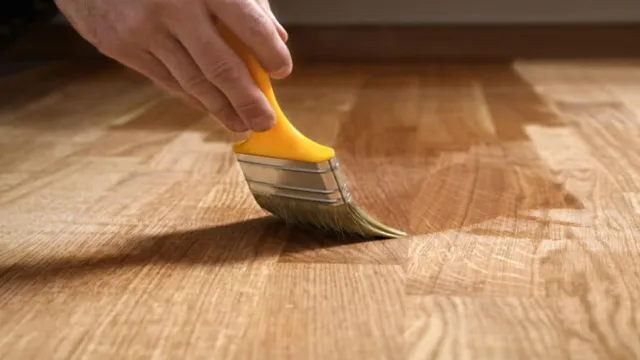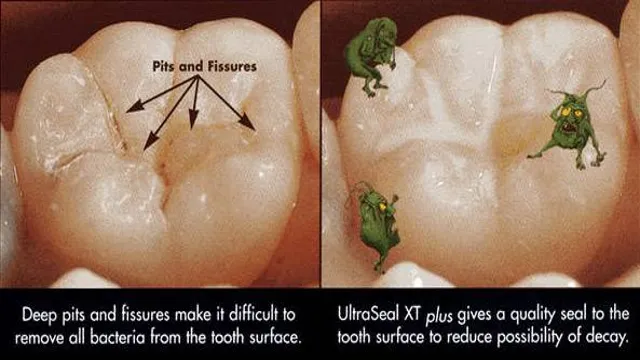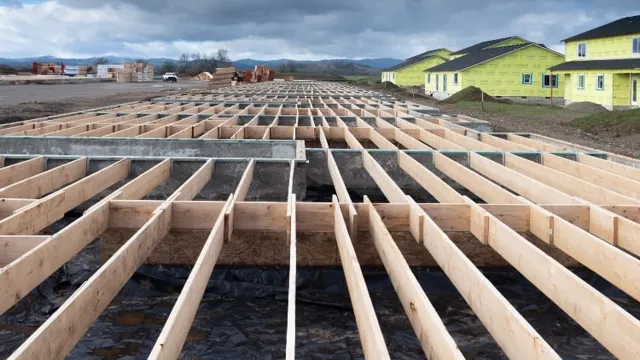Can You Use 18 Gauge Nails for Baseboards? An Expert Opinion and Best Practices.

As a homeowner, you want your baseboards to look as clean and polished as possible. However, when it comes to nailing them into place, the choice of nail gauge can be confusing. Can 18 gauge nails be used for baseboards? It’s a common question that many homeowners ask, and the answer is yes, but with a few caveats.
In this blog post, we’ll explore the pros and cons of using 18 gauge nails for baseboards, and provide some tips on how to get the best results. So let’s get started!
Understanding Nail Gauge
If you’re wondering whether you can use 18 gauge nails for baseboards, the answer is yes! However, it’s important to note that the gauge of a nail refers to its thickness, and thinner nails may not be strong enough for baseboards. Generally, professionals recommend using 15 or 16 gauge nails for baseboard installation as they are thicker and can handle the weight of the wood without bending or breaking. That said, 18 gauge nails can be used for lighter baseboards or in conjunction with construction adhesive.
It’s always best to consult with a professional or refer to the manufacturer’s recommendations before selecting the gauge of nail for your specific project. Remember, selecting the right nail gauge can help ensure the longevity and durability of your baseboards.
What Does 18 Gauge Mean?
If you’ve ever gone to purchase nails or staples, you may have noticed a number followed by “G” on the packaging. This number refers to the gauge of the nail or staple, which determines its thickness. 18 gauge, for example, is a common size for finish nails and brads.
The smaller the number, the thicker the nail, and vice versa. Understanding nail gauge is important because it can affect the strength and appearance of your project. Thinner gauges may leave visible holes or become bent during installation, while thicker gauges may split wood or be too heavy for delicate applications.
So, next time you’re working on a project, be sure to choose the appropriate nail gauge for the job at hand.

What is a Baseboard?
A baseboard is a type of trim that covers the joint between the floor and wall. It not only adds a decorative touch to a room but also protects the wall from damage and hides any imperfections in the flooring. One aspect of baseboard installation that is important to understand is nail gauge.
Nail gauge refers to the thickness of the nail used to attach the baseboard to the wall. Typically, a 15 or 16-gauge nail is used for baseboard installation. Using the correct nail gauge ensures that the baseboard remains securely attached to the wall and can withstand forces like foot traffic or furniture bumping into it.
It’s important to note that using a nail that is too thin (higher gauge number) can cause the baseboard to loosen over time, while using a nail that is too thick (lower gauge number) can cause the baseboard to split. So, when installing baseboards, it’s important to pay attention to nail gauge and use the appropriate size for the job.
Benefits of Using 18 Gauge Nails for Baseboards
Yes, you can certainly use 18 gauge nails for baseboards and there are actually quite a few benefits to doing so. For starters, 18 gauge nails are thinner than 16 or 15 gauge nails, which means they leave smaller holes and are less likely to split your baseboard or molding. They are also easier to hide and sand down if needed.
Additionally, 18 gauge nails are typically cheaper than their thicker counterparts, making them a budget-friendly option for those who need to install a lot of baseboards. Finally, because 18 gauge nails are thinner, they are less likely to cause damage to your nail gun over time, which can save you money on repairs or replacements. All in all, if you’re looking for a reliable, cost-effective option for baseboard installation, 18 gauge nails are definitely worth considering.
Strength and Durability
When it comes to installing baseboards, using 18 gauge nails can be a game-changer. These nails are strong and durable, which means that they can withstand a lot of wear and tear over time. Additionally, they are less likely to split or crack the baseboard material, ensuring a seamless and secure installation.
Choosing the right size of nails is crucial because it affects the overall strength and stability of the baseboard. By using 18 gauge nails, you can be confident that your baseboards will be able to withstand any impact and last for years to come. The added benefit is that the smaller size of the nails makes them less noticeable, which results in a more polished and professional-looking finish.
So, if you want to ensure the strength and durability of your baseboards, consider using 18 gauge nails in your next project.
Ease of Use
When it comes to installing baseboards, using 18 gauge nails can make the process much easier. One of the main benefits of using these nails is their size. They are smaller in diameter than other common nail sizes, which means they make a smaller hole in the baseboard and in the wall.
This translates to less damage to your walls, which is especially important if you’re working with delicate or expensive finishes. Additionally, using 18 gauge nails can save you time and effort since they are thinner and easier to maneuvre into tight spaces. All in all, if you want smoother, faster installation of your baseboards that will require less effort and cause less damage to your walls, 18 gauge nails are a great choice!
Cost-Effective
If you’re installing baseboards and looking for a cost-effective option, consider using 18 gauge nails. These nails are thinner and lighter than other common nail sizes, which means they’re cheaper and more widely available. Plus, since baseboards are typically decorative rather than load-bearing, thinner nails won’t compromise the integrity of your structure.
There are a few other benefits to using 18 gauge nails for baseboards as well. Firstly, they create smaller holes in your trim, which means less touch-up work after installation. Secondly, since they’re smaller, they’re less likely to split the wood as you nail them in.
Overall, 18 gauge nails can be a great choice for budget-conscious DIYers or professionals looking to cut costs without sacrificing quality.
Considerations When Using 18 Gauge Nails for Baseboards
Are you wondering if 18 gauge nails can be used for baseboards? The answer is yes, but there are a few things to consider before you start nailing away. First, keep in mind that 18 gauge nails are thinner than the standard 16 gauge nails commonly used for baseboards. This means that they may not hold as securely, so you’ll want to make sure that your baseboards are properly supported and have a solid backing.
Additionally, because 18 gauge nails are thinner, they may be more prone to bending or breaking, especially if you’re nailing into hardwoods. So, take extra care when nailing to ensure that you don’t damage the baseboard or the wall. Finally, keep in mind that using a thinner nail may result in a less secure connection, which could lead to gaps or squeaks in your baseboard over time.
Overall, using 18 gauge nails for baseboards is possible, but it’s important to consider these factors to ensure that your baseboards stay securely in place for years to come.
Length of the Nail
When it comes to baseboard installation, using the right nail size is crucial for a strong and secure hold. One of the most commonly used nail sizes for baseboards is 18 gauge nails, but it’s important to consider the length of the nail as well. A nail that is too short won’t penetrate deep enough into the baseboard and wall, while a nail that is too long can cause damage to the wall or even puncture through to the other side.
Generally, a nail length of 1 ½ inches is suitable for standard ¾ inch thick baseboards. However, if the baseboard is thicker or made of a denser material, a longer nail may be necessary to ensure a secure hold. It’s important to always measure the baseboard and the wall thickness before selecting the appropriate nail length.
Choosing the right nail length can make all the difference in achieving a polished and professional looking baseboard installation.
Material of the Baseboard
When it comes to choosing the material of your baseboard, there are many factors to consider before using 18 gauge nails. One important consideration is the type of material your baseboard is made of. If you are working with hardwood or other dense materials, using 18 gauge nails may not be strong enough to hold the baseboard securely in place.
On the other hand, if your baseboard is made of softer materials such as MDF or pine, 18 gauge nails may be too thick and cause the wood to split. It’s important to choose the right nail size according to the material of your baseboard to ensure a secure and long-lasting hold. Remember to always test your nails on a scrap piece of baseboard before installing to avoid any unwanted damage.
Conclusion
After much research and consideration, it is safe to say that the answer to this question is as clear as the difference between a hammer and a potato. While 18 gauge nails may work for some baseboard applications, it is important to consider the thickness and durability of the material being used. In some cases, a thicker gauge nail may be necessary to ensure stability and longevity.
So, before you hit the hardware store, be sure to measure twice, nail once!”
FAQs
What size nails should I use for baseboards?
It’s recommended to use 15 or 16 gauge nails for baseboards. 18 gauge nails may not provide enough strength to hold the baseboard securely in place.
Can I use 18 gauge nails for smaller baseboards?
Yes, you can use 18 gauge nails for baseboards that are 2 1/4 inches or smaller in width. Anything wider than that should use 15 or 16 gauge nails.
What length nails should I use for baseboards?
The length of the nails you use for baseboards should be at least 1 1/4 inches long. This length ensures that the baseboard is securely attached to the wall.
Should I use finishing nails or brad nails for baseboards?
It’s best to use finishing nails for baseboards because they have a larger head that helps hold the board in place. Brad nails may not provide enough holding power, especially for larger baseboards.
Can I use a nail gun for baseboard installation?
Yes, a nail gun can be used for baseboard installation. However, make sure to use the proper gauge and length of nails and adjust the depth setting on the nail gun to avoid damaging the baseboard or wall.
Do I need to use adhesive in addition to nails when installing baseboards?
Using adhesive in addition to nails can provide extra stability and prevent the baseboard from shifting or separating from the wall over time. However, it’s not always necessary and depends on the specific installation.
How far apart should nails be placed when installing baseboards?
Nails should be placed approximately every 16 inches along the length of the baseboard to ensure it is securely attached to the wall. It’s also recommended to add additional nails around corners and joints for added stability.

